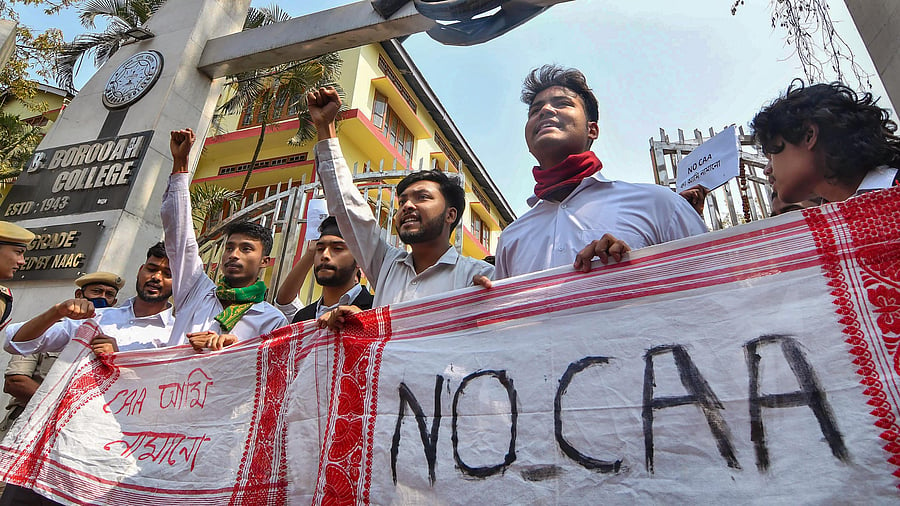
Protests against CAA implementation in Guwahati.
Credit: PTI
Guwahati: The rules released by the Centre for implementation of the Citizenship (Amendment) Act (CAA) 2019 on Monday left Ranjit Debnath confused and angry.
The 49-year-old shopkeeper in western Assam's Barpeta town is among the 19.06 lakh people who were left out of the NRC draft released in August 2019.
Debnath was impatiently waiting for resumption of the process for filing an appeal in the Foreigner Tribunal (FT) to get his name cleared in the final NRC list. "I am an Indian but the CAA says we must declare ourselves as a Bangladeshi for getting Indian citizenship. This is ridiculous.
Let the NRC process be over first so that we can clear our names in the FT," Debnath told DH over phone on Wednesday. "I will not declare myself as Bangladeshi."
Debnath says the government should have waited for completion of the NRC appeal process and make the CAA applicable only for those who fail to clear their names for the final NRC list. "I submitted pre-1971 documents but even today, we have not yet been informed about why my name was rejected. Probably there were small technical errors which I am confident would be rectified in the FT."
The Register General of India, the nodal agency which was updating the NRC in Assam, under the supervision of the Supreme Court, has not yet notified the NRC list.
The NRC process, in fact, has remained stalled as several organisations in Assam filed petitions in the Supreme Court seeking reverification of the draft.
Even the office of the NRC co-ordinator in Assam also filed a petition in the apex court seeking reverification of the NRC "final draft." The BJP-led government in the state too refused to accept the present draft of the NRC saying that many names were fraudulently included or excluded during the exercise.
Even as the NRC process has remained stalled, release of the CAA rules has left the NRC left outs, nearly half of whom are Hindus, confused. The confusion grew on Tuesday when Assam CM Himanta Biswa Sarma told reporters that only those left out of the NRC might apply for Indian citizenship through the CAA. "None other than the NRC left outs will apply for citizenship through the CAA. Who will declare himself as a foreigner first to get benefits of the CAA? Sarma asked. But Debnath fears that an application under the CAA could tag him as a foreigner and may face the stigma of being a Bangladeshi in Assam.
Aman Wadud, a lawyer of Gauhati High Court, who provided legal assistance to many NRC left outs in Assam, told DH that an NRC excluded person can now seek citizenship under the CAA and get exempted from the Foreigner Tribunal appeal but at the cost of declaring themselves as Bangladeshi. "Also an applicant will get benefits under the CAA, as per the notified rules, only if he can submit documents proving that either they or their ancestors are from Bangladesh, Pakistan or Afghanistan. In the NRC they submitted documents prior to 1971, the cut-off date, to prove their Indian citizenship, and now under the CAA, they will have to prove that they or their ancestors are from either of the three countries," he said.
"Ancestors of many Hindus excluded from NRC were residents of British India, they never resided in Bangladesh or even East Bengal, how are they supposed to trace their ancestry to Bangladesh now?" Wadud asked.
The CAA allows the non-Muslim "persecuted migrants" from Bangladesh, Pakistan and Afghanistan (till December 2014) to apply for Indian citizenship.
Although BJP is projecting the CAA as a historic move, the Opposition parties sniff a political motive behind release of the rules ahead of Lok Sabha polls. "In Assam, they are only trying to create a hype over the CAA in order to strengthen BJP's grasp over the Hindu votes," said a leader of Asom Jatiya Parishad (AJP), a regional party, which was born out of the anti-CAA agitation in 2019. The AJP is likely to contest in one of the 14 Lok Sabha seats in Assam as part of alliance with other Opposition parties, including the Congress. The protest against the CAA, meanwhile, is on.